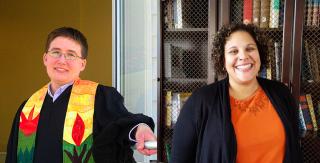Experiential Education


Resources Curated by Rev. Evin Carvill-Ziemer (left), CER Program Manager for Youth Ministry and Shannon Harper (right), CER Youth and Young Adult Coordinator.
An experience
followed by reflection
brings learning and growth
Experiential education is a learning theory that particularly fits with our theology, which knows each of us must wrestle out meaning from our lives for ourselves. It is helpful for debriefing games, activities, youth group projects, and much more. Use it when things went great and when they were an utter flop. It is also a helpful frame for us as pastoral caregivers where our role is to support people to make meaning out of their lives and make their own decisions about what actions to take.
Experiential education assumes:
People learn best from experience
Every experience has something to teach us
The learning is enhanced by intentional reflection
People can often find their own best solutions to their problems
People are more committed to solutions they find themselves
People learn from the chance to make their own mistakes
Everyone has wisdom and has something to teach – we’re all teachers and learners
We cannot control the outcome — we may experience failure, success, and confusion along the way.
Questions to use for processing experiences
1. What?
What happened? Then what? Tell me more about …?
2. So what?
So how do you feel about that? So what does that mean to you?
So what does this experience remind you of?
3. Now what?
What are you going to do? What should we do differently next time?
Tips:
Use for pastoral care and peer chaplaining to help people find their own solutions
Take the time for each step. Often people haven’t stopped to really clarify what happened or how they feel about it
Don’t assume that the problem initially presented is the real problem; often somewhere in “so what?” the real issues surface
Often the processing steps flow naturally and as someone gets to the key part of “so what?” they begin answering “now what?”
If people don’t have answers for “now what?” it usually means there is something left in “so what?” to explore